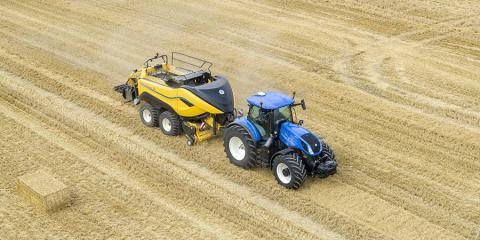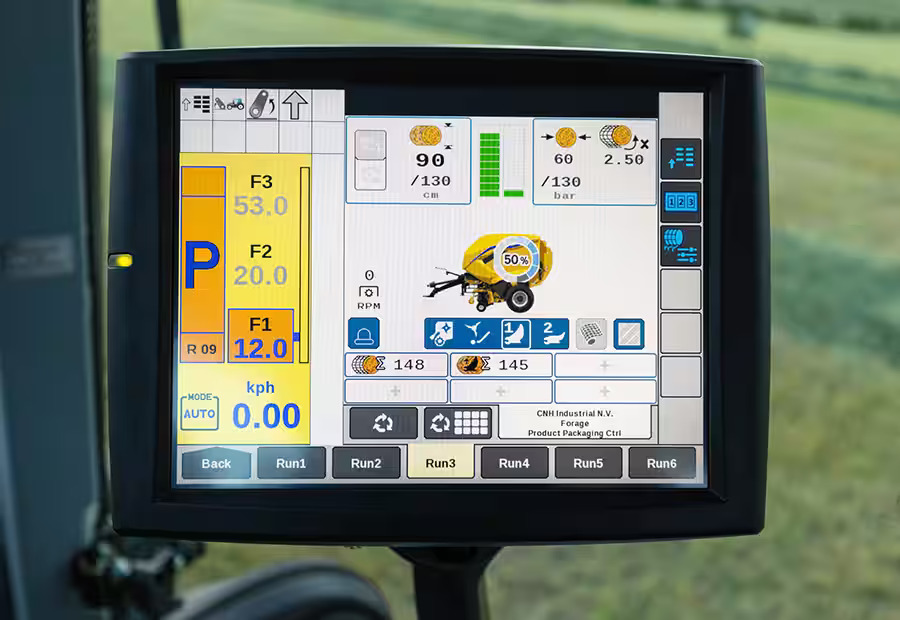Automatic baler optimises bale production

In agriculture, hay and straw remain important products, including for feeding animals or as ground cover in livestock. Harvesting, packing and storing them is therefore a common process in the sector. Traditionally, these crops and stalks are baled and then packaged for later use, but this turns out to be a complex task involving a lot of skills. Finding or training experienced operators for this task is therefore a challenge in the agricultural sector. With an automated baler, we make this process much easier and more efficient, making it easier for any operator to produce quality bales.
Classical approach
Today, on the one hand, an operator has to control the tractor pulling the baler, both in terms of steering and speed. On the other hand, it also constantly monitors the various settings of the baler, such as the pressure in the bale chamber, and adjusts where necessary. All these factors influence the quality of the bales that eventually roll out of the baler. For example, the amount and moisture levels of the crop can vary in the swaths (long strips) in which they usually lie after harvesting. Therefore, the tractor's steering and speed must be constantly adjusted so that the baler can receive a constant inflow of crop. If an operator does not do this, the sizes and weights of bales soon start to vary, making transport and later use more difficult from the outset.
Automation
Flanders Make therefore teamed up with CNH Industrial to find a way to automate this process or at least provide more support to the operator. The developed solution consists of two parts. On the one hand, there is automatic navigation in which the tractor, with the help of LIDAR (LIght Detection And Ranging) and a guidance controller, will judge for itself how best to keep driving centrally over the swath. But also depending on the amount of crop, the speed is adjusted so that the inflow can remain constant. This still involves a driver at the moment, for safety and steering between swaths. On the other hand, we are optimising the baler settings so that each bale can reach a certain target weight with a constant crop inflow. By combining these two elements, the process can be a lot more efficient and faster. The end result during tests was therefore clear: homogeneous bales with the desired weight and, on top of that, more kilograms of bales per hour and also a decrease in fuel consumption.

Testing in simulations
One factor that recurs regularly in Flanders Make studies is that physical testing is often very costly or stressful. Not only do we regularly use pricey technology, there is also often a certain process we need to interrupt in order to run our new solution on it. This was also the case in this study, where there was no room to go through the process hundreds of times and work out improvements along the way. The loss to a farmer would simply be too great in the early stages of development. Also, the test can only be conducted during the harvest season.
When a physical test is difficult, tests are run digitally first. By working out simulations, we can already test a lot of logic, such as driving a digital twin of the tractor and baler around. When those tests go well and the chances of a successful physical test are high, we can work out a solid prototype. The big advantage of this approach is that virtual testing allows us to already try out a range of concepts and even largely finalise the software. This ensures that the final prototype performs a lot more in line with expectations.
CNHi wins awards
Partly due to this research, CNH Industrial was able to continue working on developing its New Holland Baler Automation System, in which their tractors and balers work together to largely automate the process of baling. The driver only specifies the weight of the bales, the system then does the rest.
They presented this new technology at the Agritechnica 2022 fair, where they were immediately awarded the silver medal for innovation by an independent committee of experts.
Automated farming
This research represents another step towards fully automated farming. Automating and supporting the sector is important to cope with increasing food demand and labour shortages, but also to cope with the effects of climate change. A more efficient agriculture, where we can maximise yield and minimise effort, is therefore a CNH target that Flanders Make is happy to support.
